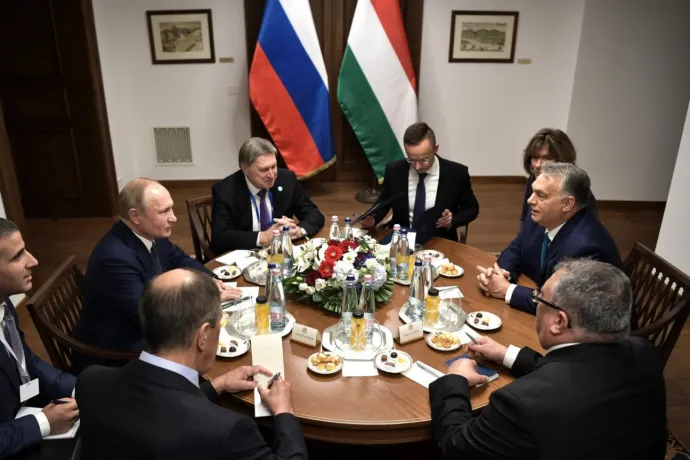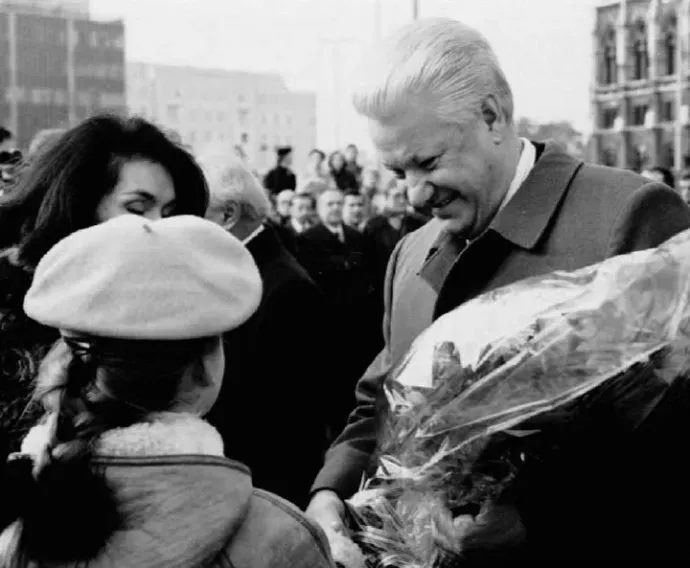The Russian textbook referring to 1956 revolutionaries as fascists reveals how strongly the Hungarian government has chained itself to Putin

The news broke on Sunday that a new Russian state textbook commissioned by Putin portrays the 1956 Hungarian revolutionaries as fascists. Days later, from the Hungarian government’s side, only a state secretary has spoken up; Orbán, Szijjártó and Fidesz remain profoundly silent.
In 2016, on the 60th anniversary of the 1956 revolution, Russian state television played a ten-minute special on the events in Hungary. The programme explained that the 1956 uprising was organised from the West, and that the rebels released thousands of Nazis from prisons, who then went house to house hunting communists and Jews.
At the news of the broadcast, Péter Szijjártó, who was foreign minister at the time, summoned the Russian ambassador and issued a statement saying that "we will not tolerate anyone talking about the 1956 revolution and its heroes in a humiliating way". The Russian ambassador insisted that what was said on the programme did not correspond to the official Russian position. As early as 1992, Russian President Boris Yeltsin had already apologised for the bloodshed of 1956, and in 2006 Putin laid a wreath at the monument to the victims of the revolution in Budapest.
7 years later
Fast forward to the summer of 2023, when something much more serious happened in Russia. Not only was there a broadcast on state television calling the revolutionaries of 1956 Nazis hunting communists, but it has now been put into a history book (and thus inserted into the foundations of the nation's understanding of history) that the '56 revolutionaries were fascists. This effectively made it Russia's de facto official interpretation of the events of that time.
As this is a very serious shift in memory politics, one would think that the reaction from the Hungarian government and the ruling parties would be much more severe than in 2016. This is why, on Monday we sent some questions to the people and institutions most concerned with the content of the Russian textbook. We were curious about two things:
- What is their view of the fact that Russia's decision-makers are interpreting the events of 1956 in this way?
- Would they initiate the summoning of the Russian ambassador or any other diplomatic action?
The above questions were addressed to all of the below on Monday morning:
- Prime Minister Viktor Orbán;
- the Ministry of Foreign Affairs and Trade;
- the Ministry of Interior (education falls under their purview);
- Fidesz;
- Fidesz' parliamentary faction;
- Additionally, on Monday afternoon, we also wrote to President Katalin Novák's office.
None of them responded.
Although, in the meantime, Tamás Menczer, State Secretary for bilateral relations at the Ministry of Foreign Affairs did voice his position in three sentences on Origó: “In 1956 the Hungarian people rebelled against the communist dictatorship. This is a clear, unequivocal fact, not a matter up for debate. Any claim to the contrary is false. What happened is so clear that we will not open a debate with anyone about it.”
The only thing Tamás Menczer forgot to mention was whether he condemned the Russian history textbook, whether the ambassador will be summoned, or whether the Russian leadership will be called on in another forum to re-examine the textbook's passage in question. Menczer wrote that they do not want to open a debate on the issue, which suggests that they consider the issue to be settled.
Summoning an ambassador is one of the lowest signals in diplomacy, and one that Péter Szijjártó has used repeatedly in recent years. For example, he summoned the Ukrainian ambassador at the end of 2021 and in the spring of 2022, in the latter case because he believed that Zelensky had insulted Hungary. In 2019, the Dutch ambassador was summoned simply because Dutch Prime Minister Mark Rutte had said: Hungary does not respect the rule of law.
We also sent questions to Mária Schmidt (historian and Government Commissioner of the Memorial Year of the 1956 Revolution, and Director-General of the 20th Century Institute), who didn't respond, and to the 20th Century Institute. The institute did, however post on Facebook about '56, but they forgot to mention that they had a problem with the Russian textbook. Szilárd Demeter (who as director of the Petőfi Museum of Literature has little to do with foreign policy) was the only one who sent a meaningful reply, calling the content of the Russian textbook outrageous.
What do the Russians think about 1956?
To understand this question, it is worth recalling that this is not the first time that Moscow's position on 1956 has changed. Before the regime change, 1956 was seen as a reactionary counter-revolution in the Soviet Union. Then in 1991, Boris Yeltsin, a former communist who later became an anti-communist, became President of Russia and he acknowledged the mistakes of the Soviet system. In line with this, when visiting Budapest in 1992, he apologised for the bloody crushing of the revolution.

From then on, the official Russian position has been that in 1956, the Hungarians rebelled against a dysfunctional political establishment which bore a Stalinist legacy. In 2006, members of the Russian parliament’s upper house issued a statement expressing their sense of moral responsibility and regret for the Soviet intervention in 1956.
Then, as Putin's regime began to change, the perception of the Soviet Union's legacy gradually changed as well. While in the 1990s Russia still saw itself as a state that had gained independence from the Soviet Union, it now sees itself more as the heir to the Soviet Union. Consequently, there is a gradual return to the Soviet interpretation of history.
Diplomatic constraints
It is hard to imagine that those in the government or Fidesz would agree with the content of a Russian history textbook that calls the revolutionaries of 1956 fascists. It is also hard to imagine that they would not find such an interpretation of the events outrageous.
Which makes it all the more telling that, apart from Menczer's three feeble sentences, no one from Fidesz or the government has been able to/has dared speak up about the Russian textbook, and they haven't even summoned the ambassador. Although Russian-Hungarian relations would probably survive the Russian Ambassador having 15 awkward minutes at the Foreign Ministry in Budapest.
But even that is not likely to happen.
For more quick, accurate and impartial news from and about Hungary, subscribe to the Telex English newsletter!